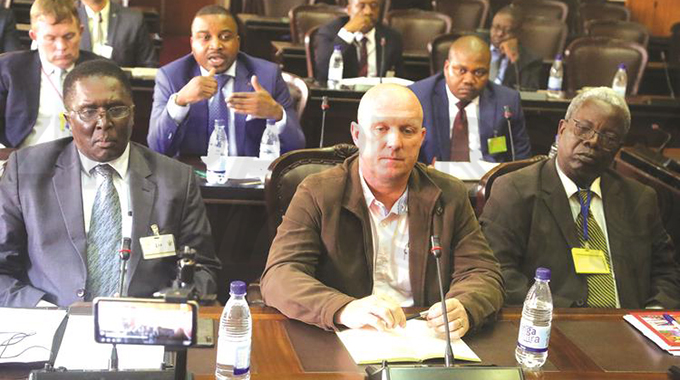
Zvamaida Murwira and Rudo Muchedzi
Grain Marketing Board (GMB) senior executives were yesterday accused of allocating subsidised maize to millers who are allegedly diverting it to the black market and countries like the Democratic Republic of Congo (DRC).
In the last National Budget, Government switched from subsidising maize to roller meal actually milled and distributed to ensure that markets continue to operate properly for farmers and importers.
But in hearings, legislators heard that some trucks plying the Sadc region had been ferrying Zimbabwe’s subsidised maize allegedly issued through a named senior GMB executive who was allocating grain to some millers beyond their plant capacities.
The millers were giving evidence before Parliament’s Lands, Agriculture, Water, Climate and Resettlement Portfolio Committee chaired by Gokwe Nembudziya legislator Cde Justice Mayor Wadyajena (Zanu-PF).
The committee heard that trucks, upon offloading copper in South Africa from DRC, would return and be cleared at the Zimbabwean border ostensibly carrying maize only to pick the grain in Harare before heading for Kinshasa.
The committee sought to understand how a US$27 million wheat import facility from the Reserve Bank of Zimbabwe (RBZ) was used.
a miller, Mr Wayne Moss of Mr Brands, said he had seen subsidised maize being sold on the black market in several areas and in Mozambique.
“The abuse is rife. It is so serious that it has to be dealt with. There is abuse within GMB which you are already dealing with on who gets what allocation. People are using roller meal maize to process other commodities. There is maize going to DRC,” said Mr Moss. “I have been in Mozambique, in Mutare if you go to a retailer and I have evidence, there is (10kg) mealie-meal which is being sold at $110 transfer. I have got the receipt.
“If you are in the milling industry, if you are importing maize, you cannot sell it at $110. It can only be subsidised maize, which is for roller meal, and not super refined.”
Another miller, Mr Davies Muhambi of United Milling Company said some millers were getting maize allocations from GMB beyond their plant capacities and would offload the excess on the black market.
He said excess maize would either be sold to bigger millers or exported to neighbouring countries.
“GMB would inspect your plant and they had ratings of the plant and they would give you a certain rating of capacity and that was supposed to be used to allocate maize.
“The guy with the biggest capacity should get the biggest allocation because he can utilise it, and a smaller guy should get proportionately less.
“From the list of allocations I saw, I realised that certain millers with a plant capacity of milling, say 200 tonnes per week, would get 600 tonnes per week.
“This is where you need to inquire. Where was that balance going because every week, you have to submit returns to justify the next allocation?” said Mr Muhambi.
“That list was controlled by Lawrence Jasi of GMB. This is what led the Government to change the whole scenario of the subsidy programme. We hear so many stories that some of the maize would be sold to bigger millers who would use it for other processes like stockfeeds, porridge and remember the subsidised maize is cheap.”
He said trucks were carrying subsidised maize to DRC after buying the grain for a song.
“That was the maize that was then being loaded to DRC. Trucks that carry copper from the north which is Zambia and DRC, going to South Africa, they come back empty. But at the border they are stamped to have cargo which is maize from South Africa. They come through Harare, pick up that maize, exit Chirundu with Zimbabwean subsidised maize. This is what has been happening. But we are not an investigative arm. If I go to those organisations involved and ask for certain documents I will not get, so it will be hard to have evidence. But if you give us a team, we will give you leads,” he said.
National Foods group chief executive officer Mr Mike Lashbrook said the millers’ relationship with the Grain Millers Association of Zimbabwe (GMAZ) led by Mr Tafadzwa Musarara was helping millers in lobbying to get good terms from Government for their business.
He was responding to suggestions that GMAZ had been captured by big millers with a huge financial muscle who were benefiting at the expense of smaller and struggling millers.
Earlier on, some smaller millers had indicated that they were getting a raw deal from GMAZ which they said was being run by huge milling businesses.
